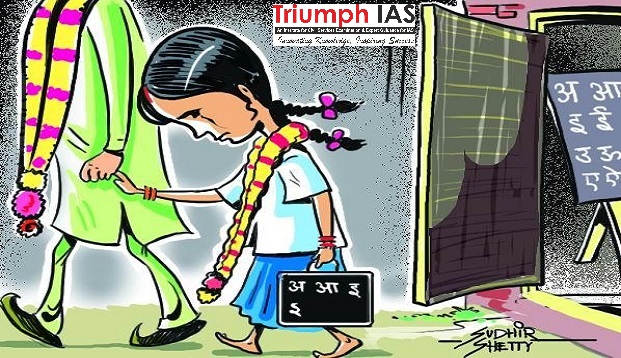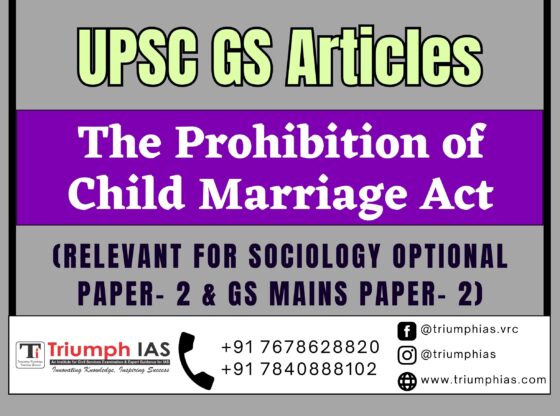The Prohibition of Child Marriage Act
Relevant for sociology optional Paper- 2 & GS Mains Paper- 2

The Prohibition of Child Marriage Act is a law that was passed by the Indian Parliament in 2006 to prevent the practice of child marriage in India. Child marriage is a common practice in India, where young girls are forced to marry at a young age, often before they reach puberty. The practice of child marriage is a violation of basic human rights, as it deprives children of their childhood and exposes them to various health and social problems.
The Prohibition of Child Marriage Act aims to prohibit child marriages and to provide legal protection to children who are at risk of being married off at a young age. The act defines a child as a person who is below the age of 18 years for girls and 21 years for boys. The act makes it illegal for anyone to marry a child or to cause a child to be married. The act also imposes penalties on those who aid, abet, or participate in child marriages.
The Prohibition of Child Marriage Act provides for the punishment of those who violate the provisions of the act. The act states that anyone who performs, conducts, or directs a child marriage shall be punished with imprisonment for a term of not less than two years and up to seven years. The act also imposes a fine of up to one lakh rupees for those who perform, conduct, or direct a child marriage. The act also provides for the punishment of those who abet, aid, or participate in child marriages. The act states that anyone who abets, aids, or participates in a child marriage shall be punished with imprisonment for a term of not less than two years and up to seven years.
The Prohibition of Child Marriage Act also provides for the protection and welfare of children who are at risk of being married off at a young age. The act states that any child who is married off before the age of 18 years for girls and 21 years for boys shall be entitled to maintenance and support from their parents or guardians. The act also provides for the appointment of Child Marriage Prohibition Officers, who are responsible for preventing child marriages and for ensuring the protection and welfare of children who are at risk of being married off at a young age.
The Prohibition of Child Marriage Act has been successful in preventing child marriages in India. The act has raised awareness about the issue of child marriage and has led to a change in public attitudes towards the practice. The act has also led to a reduction in the number of child marriages in India.
Despite the success of the Prohibition of Child Marriage Act, child marriage continues to be a problem in India. Many children, especially girls, continue to be married off at a young age, often due to poverty, social pressure, and traditional beliefs. The government of India has taken various measures to address the problem of child marriage, including awareness campaigns, education programs, and the provision of social and economic support to families.
In conclusion, the Prohibition of Child Marriage Act is an important law that aims to prevent the practice of child marriage in India. The act provides legal protection to children who are at risk of being married off at a young age and imposes penalties on those who violate the provisions of the act. The act has been successful in preventing child marriages in India and has raised awareness about the issue. However, there is still a long way to go in eliminating the practice of child marriage in India. The government of India must continue to take measures to address the root causes of child marriage and to provide social and economic support to families to prevent child marriages. It is imperative that children in India are allowed to enjoy their childhood and are given the opportunity to grow up and develop to their full potential.
For more such free UPSC notes, Articles, News & Views Join our Telegram Channel. https://t.me/triumphias
Click the link below to see the details about the UPSC – Civils courses offered by Triumph IAS. https://triumphias.com/pages-all-courses.php


